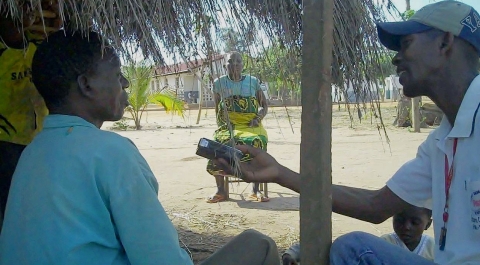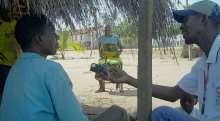
Radio reporter Zao Ali Issufo interviews a neighbor who lives near a rural health post in Mozambique. The neighbor claims the nurse drinks alcohol too often, and says she needs to change her ways or leave the position. (Photo by Mercedes Sayagues)

Radio reporter Zao Ali Issufo interviews a neighbor who lives near a rural health post in Mozambique. The neighbor claims the nurse drinks alcohol too often, and says she needs to change her ways or leave the position. (Photo by Mercedes Sayagues)
A family who lives across from the hospital protested that the nurse often ignores emergencies and mistreats patients. The village chief said that the nurse’s problem is too much “drink,” meaning alcohol, which leads to absenteeism, overcharging and impatience.
“Either the nurse changes her ways or the authorities must change the nurse,” summed up the neighbor.
[video: 43081, left, medium]Issufo returned with these quotes. What to do next? We decided to see the district health administrator back in Mueda a few days later. The administrator had heard about this problem but was not aware that the community was so upset.
He explained his quandary: Rural Mozambique has a dire shortage of medical staff. Living conditions are dreadful, especially in this remote district. Seasoned professionals will not accept those posts. Fresh graduates must work in a rural area for one year, but until the next nursing class graduates in mid-2012, no new staff will be coming to the district. What is best for the village, he asked, a nurse who is sometimes functional or no nurse at all?
Nonetheless, he would go talk to her and he asked Issufo to hold the story until he returned. For that reason, I am not naming the nurse, or the village she works in. A few days later, we saw the administrator speed by in an ambulance toward the village.
Meanwhile, Issufo and I discussed the nurse, whom we had met at the clinic. She has young children and an absent husband. If she loses her job, how will she provide for her family?
What is her life like in a remote village with no electricity, overworked, with only two nurses and no doctor to assist more than 10,000 people, while earning a meager salary of around US$120 a month? Maybe this situation led her to alcohol. Sadly, alcoholism, although widespread, is not recognized as a treatable addiction in Mozambique. There are no provisions, even in the capital, to help alcoholics. The following day, during the training session, I introduced the reporters to the excellent manual on investigative reporting in Africa produced by the Forum for African Investigative Reporters (FAIR), and the Konrad Adenauer Stiftung, a political foundation that funds civic education projects.
What Issufo did, I explained, is investigative reporting at the hyper-local level. He discovered a problem that affects people’s health, found out the facts, looked at several angles and viewpoints, saw many dimensions, and approached authorities to respond.
He may not get a story out of it but he did get action from the government. Reporting that makes a difference does not have to be about ministerial corruption or illegal logging. It can be about small issues that impact people’s lives. Issufo looked pleased. He is 28, trained as a sound technician, and started reporting just a year ago. He produces a program called “Take Care of Yourself,” with advice for a healthy life. Next year, the Spanish NGO we were traveling with, Medicos do Mundo, or Doctors of the World, might sponsor his program and help him with content.
Later, I interviewed Issufo on video. ‘I am ready,” he beamed. “I learned that I can do reporting that makes a difference. I feel stronger as a journalist. I want to do more.”
Editor’s note: Mercedes Sayagues is a Knight International Journalism Fellow in Mozambique. She recently journeyed to the most remote region of the country with a rookie reporter to investigate conditions at the health posts and hold a training session for radio reporters there. What she found was sometimes startling, sometimes grim, and certainly proving that answers aren’t always obvious. Below, the first of several blogs.